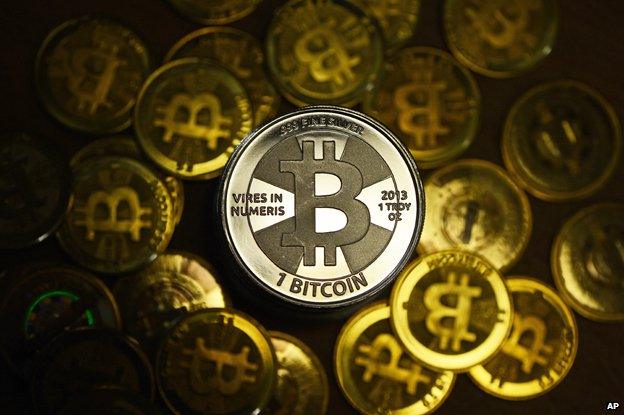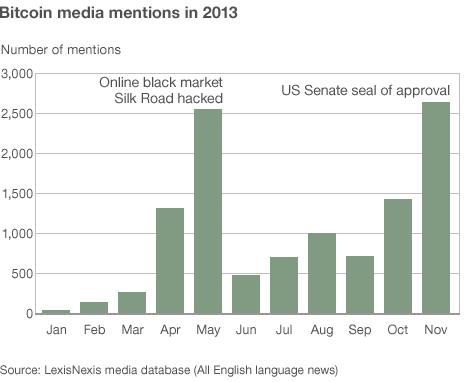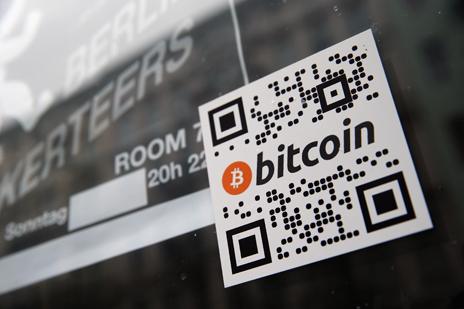Bitcoin: Price v hype
- Published

Virtual currency Bitcoin has attracted increasing media attention over the past year. It's also soaring in value, with a single bitcoin surpassing $1,000 (£613) for the first time in November. So has the media hype driven the price hike?
To the average man in the street, Bitcoin is a complicated concept.
You might grasp what a typical currency is. The pound is influenced by a central bank - the Bank of England. When it puts up interests rates, or it's expected to, the value of the pound might subsequently go up.
If the Bank of England prints more money, or there is speculation that it will, the value's probably going to go down. Ultimately, the value's determined between buyers and sellers on the international markets.
Bitcoin's a bit different. There's no central bank. It's stateless. And the supply of Bitcoin is determined by an algorithm that allows computers around the world to "mine" the currency at a set rate per day. There's a limit - about 21m - to how many can ever be mined and no way to issue a flood of new Bitcoins and devalue those already in circulation.
The currency's value - according to about 60 exchanges around the world where Bitcoins are bought and sold - is volatile. Unlike with the dollar or the pound, prices can vary considerably from exchange to exchange, sometimes by as much as $200.
But compared with other currencies, Bitcoin's rise has been meteoric. One Bitcoin was worth $934 on the Tokyo-based Mt Gox exchange on 10 December - up from $14 at the beginning of the year. This Tokyo exchange now represents about 25% of Bitcoin trading, down from estimates earlier this year of about 80%, but remaining one of the largest.

At the same time, there has never been so much talk about virtual currency - in social media, in blogs and in the press. Depending on who you speak to, Bitcoin is either the currency of the future or the next big bubble.
Commentators have suggested a correlation between publicity and price rise before. In November, TechCrunch's Alex Wilhelm said, external Bitcoin's price had "never been worth more, or generated more headlines that I can recall. The two are likely connected" and the Financial Times' John Authers writes, external: "Time to take the Bitcoin bubble seriously."
It's hard to get a definitive measurement of Bitcoin's press coverage. But one crude and slightly unscientific way of measuring it is using media database Lexis Nexis. Searching for "bitcoin" across all English language news brought up 2,631 articles in November. This is up from 41 in January this year.
In online media and in blogs, Bitcoin came up 14,179 times in November in the US alone - up from 187 times in January, according to PR software company Cision UK.

So has Bitcoin's rising profile boosted its price?
Michael Jackson, a partner at venture capital firm Mangrove Capital Partners, says some changes in the price of Bitcoin have clearly been because of demand fuelled by media coverage.
He cites November's recent rise as an example. "There has for sure not been a single event that has economically justified a price increase of five times in any commodity - possibly ever - over 30 days other than pure speculation," he says.
On the surface, there seem to be some obvious correlations. But the caveat is that bursts of coverage have often stemmed from major events that would clearly have an impact on the value of the currency. Other outbreaks can't be traced to a particular event.
The closure of clandestine online marketplace Silk Road - which required users to pay for their transactions using Bitcoins and was famed for selling drugs and other illegal items - in October led to a surge in media coverage. While Bitcoin's price initially dropped, it quickly bounced back.
November saw an even greater spike in media coverage when a US Senate committee hearing unexpectedly said virtual currencies were a "legitimate financial service" with the same benefits and risks as other online payment systems. Bitcoin rocketed in value and broke the $1,000 mark just over a week later.
Garrick Hileman, an economic historian at the London School of Economics, thinks the "common denominator" in press hype and price hike tends to be when Bitcoin gets some regulatory attention.
"It might seem somewhat counterintuitive," says Hileman, noting the roots of Bitcoin's popularity in the difficulty of tracing transactions, "but on the whole regulation has seen the price of Bitcoin explode upwards. Publicity is a big driver of that."
He cites the price rise in April - which he thinks was largely attributable to regulatory guidance issued by the US Financial Crimes Enforcement Network, which oversees anti-money laundering efforts, as well as the Cypriot financial crisis - as another example. Media coverage also rose in both months.
But Bitcoin core developer Mike Hearn says most of the currency's price fluctuations are "self-fuelling".
"Sudden price movements attract the attention of the media, which writes about it, and that then causes more people to decide to get involved so the price goes up, so more people start speculating.
"This accelerates until it turns into a pure speculative bubble which then pops, leaving the price down from the peak but up from where it started," he says.
Hearn says this pattern has repeated itself several times, citing April's "huge press cycle" as an example. Coindesk Bitcoin Price Index, external charts Bitcoin soaring to more than $200 after a surge in media interest, then dropping sharply to $120 after the Mt Gox exchange was hit by hack attacks. Its value the increased again in the space of a week.

However, there are exceptions to the media-price correlation.
Media coverage on Lexis Nexis shot up to 2,548 mentions in May. It was the month that Silk Road was knocked offline by a cyberattack.
Bitcoin's price was not hit by volatility though.
Jackson believes the story was a "great general interest story - a kind of mysterious, James Bond story" - which captured the media's attention. But he says he is not convinced how much turnover the site was actually generating.
He says the whole market is driven by speculation not usage.
"If you look at the pound or a typical currency, there is movement all the time. But not many people are using Bitcoins to do real transactions.
"Since the value is purely driven by the demand from incoming investors, hoping to make a quick buck, rather than any utility, this growth seems close to a Ponzi scheme," he says.
There is also a small group of people that have huge vested interests in Bitcoin which are ramping up its value with stories of Bitcoin millionaires and its progress towards legitimacy, he argues.
There are currently about 11 million Bitcoins in existence, with some concentrated holdings, which explains why trading exchanges are more susceptible to media puffery than other currencies.
Jackson believes there is demand for a virtual currency - to enable people to pay for things and subscribe to content online without needing multiple different accounts, and to move or trade assets instantaneously without fees - and that existing regulation is adequate to support its use.
But he says Bitcoin's instability, untraceability and transaction irreversibility mean that it will never become the currency of the future in its current form.
"Media hype is creating buzz but we are a long way from it being a mainstream currency," he says.
Hileman says the history of alternative currencies "shouldn't give investors a lot of comfort, because they die" but the furore about Bitcoin is "the most exciting thing since the internet".
There has also been a tonal shift in media coverage, he argues. "There was a real hostility towards Bitcoin at the beginning. Now there are stories about Argentinean farmers using Bitcoin as a way of generating income for families," he says.
Buying Bitcoins while their price is so bubbly seems to be a gamble. The European Banking Authority has just issued a warning, external on the risks of virtual currencies, saying consumers using them as a means of payment are not protected by regulation.
But investing in companies that enable the ecosystem to develop could be a sensible use of a venture capitalist's money, Jackson muses.
Follow @BBCNewsMagazine, external on Twitter and on Facebook, external